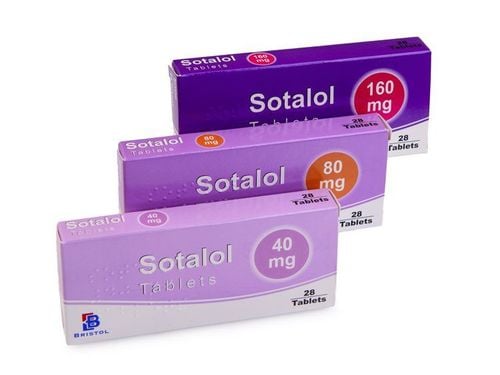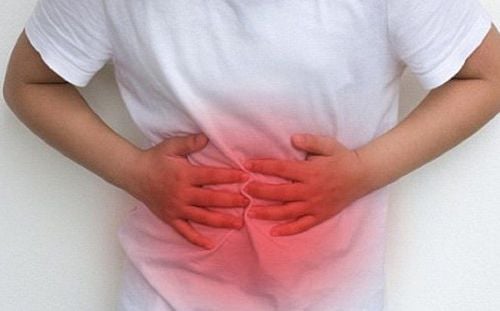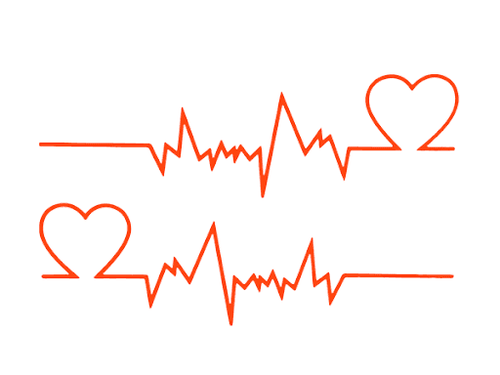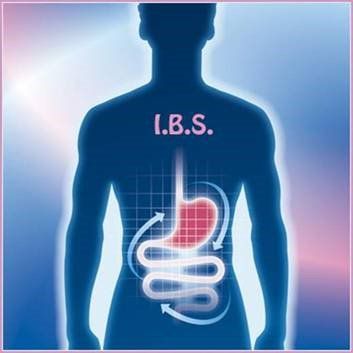This is an automatically translated article.
Anxiety is a common emotion that often precedes any other situation that makes you fearful or uncertain. Episodes of anxiety tend to be temporary with few serious symptoms or long-term health effects. Typical signs of anxiety include feeling anxious and tense, sweating, and upset stomach. Another common symptom of anxiety is an irregularly increased heart rate, also known as palpitations or palpitations.
1. Anxiety reaction
Anxiety is the body's response to stress, itself a response to a perceived threat. The threat can be real, like a hurricane hitting a coastal community, or it can be a threat we form in our minds, such as a child worrying about a child. monster under the bed. But the impact of anxiety is not just a state of mind. It's also the feeling that activates the body's autonomic nervous system (ANS), also known as the fight response. The ANS helps regulate the functions of the heart, lungs, digestive system, and various muscles throughout the body. The mechanism of action of ANS is involuntary. Therefore, you do not need to focus your thoughts on your heart to make it beat faster during exercise.
Heart palpitations can be described as feeling like your heart is beating very fast, pounding or fluttering. You may also feel as if your heart is skipping a beat. Unless your increased heart rate is caused by an arrhythmia, also known as an arrhythmia, they tend to be short-lived and harmless.
2. Personal reaction
Each person reacts to stress and anxiety differently. You may be terrified at the thought of singing in front of a crowd, but there are also people who can be so eager, happy to get up and sing a song whenever they get the chance. If you're in a situation that makes you nervous and your heart beats fast, that's a sign that the ANS has started working. Other physical symptoms may include:
Rapid breathing Sweating Muscle tension Tremors Gastro-intestinal problems Feeling exhausted Anxiety can also make you want to avoid the situation that is causing the feeling insecurity for yourself. Of course, this could mean that you might miss out on potentially interesting and rewarding things like participating in activities, missing out on job opportunities and relationships.
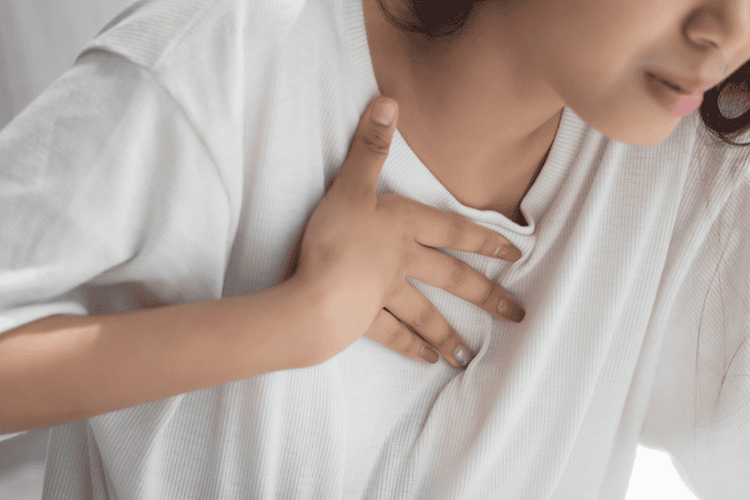
Hồi hộp có thể khiến bạn gặp tình trạng thở nhanh
3. Other causes of increased heart rate
Besides anxiety, there are a number of other causes of heart palpitations. Your chest feeling like a drum can be caused by:
Alcohol. Drinking more than one or two drinks in a night can make your heart skip a beat. People who rarely drink, but drinking too much at a party can make them feel chest tightness soon after. Caffeine. All of our hearts are sensitive to caffeine, but to varying degrees. You can drink three cups of coffee every morning and feel good. But a colleague of yours may experience a pounding chest, headaches, and other side effects if you try the same thing. With the popularity of high-caffeine beverages, such as specialty coffees and canned energy drinks, researchers are learning more about how high levels of caffeine can lead to heart arrhythmias. for high blood pressure and other problems. Chocolate. Palpitations can develop from eating too much chocolate in one sitting. Eating too much food at dinner can have the same effect. Chocolate is specifically linked to making the heart beat faster. Cold medicines that contain pseudoephedrine can cause a fast heartbeat and a feeling of restlessness. For some people, heart palpitations are a sign of an arrhythmia, a problem with your heart's electrical system that controls your heartbeat. A normal resting heart rate is between 60 and 100 beats per minute. There are many types of arrhythmias, and each produces distinct symptoms, including an irregular heartbeat. Among them are:
Tachycardia. In this condition the heart beats very fast. Episodes can last several minutes or longer. In some cases, your doctor may perform a procedure on your heart to better control electrical activity and return your heart to a steady, normal rhythm. Slow heart rate. This condition occurs when the heart beats slower than 60 beats per minute. It's not like palpitations and it's more like a slow beat. But you can still have trouble with a slow heart rate. Atrial flutter. This arrhythmia occurs when the upper chambers of the heart (the atria) beat chaotically instead of in sync with the lower chambers (the ventricles).
4. Diagnosis of anxiety
Momentary anxiety is normal, especially if you can identify the cause of your anxiety, such as getting on a plane or preparing for a job interview. These feelings do not require a doctor's evaluation unless the anxiety becomes so overwhelming that it interferes with your ability to function.
If you regularly experience anxiety or if you find yourself experiencing anxiety and don't know why, talk to your doctor or seek help from a mental health professional. Because you may have an anxiety disorder that can be controlled with a combination of therapy and medication. Diagnosing an anxiety disorder often begins with a physical exam from a doctor. Certain conditions can cause anxiety, such as:
Heart disease Thyroid disease Respiratory disorders Drug or alcohol withdrawal Blood tests and other tests may be ordered if the physical condition is impaired. suspicion causes anxiety. A mental health professional will also review your symptoms and go through a questionnaire or other psychological screening to help make diagnoses.

Bệnh tim có thể khiến người bệnh hồi hộp và rối loạn nhịp tim
5. Diagnosis of heart palpitations
If tachycardia is accompanied by identified episodes of anxiety and then subsides rapidly on its own, you do not need to see your doctor. But, if palpitations occur without cause for concern, you should definitely tell your doctor or visit a cardiologist. It can be a symptom and can be easily treated through a simple solution such as switching drugs if its cause is a side effect of a medication being taken. However, heart palpitations can be a sign of:
Anemia Thyroid disease Low blood pressure A medical condition of the heart Your doctor may use a number of different tests to help determine what is going on in your chest. They will first do a physical exam and listen to your heartbeat with a stethoscope. They may then use one or more of the following diagnostic screenings:
Electrocardiogram. Several electrodes are placed on your chest to measure your heart's electrical activity. It can help diagnose an arrhythmia or rule out a heart rhythm problem. Monitor Holter. This involves a special device that you wear 24 hours a day to record your heart rate and any changes that occur. It is usually only worn for up to three days at a time. Record events. This is usually used if the Holter monitor does not detect any rhythm abnormalities. The recorder can be worn for weeks at a time, but it only records your heart rate when you press a button during symptoms.
6. Learn to relax
If anxiety is causing your heart to beat faster, there are steps you can take to relax and slow down your beating heart. Some relaxation strategies that have been shown to work include yoga, meditation, tai chi, and deep breathing exercises.
Exercising regularly and getting at least seven to eight hours of sleep each night are two other ways to help you reduce stress in your life. Avoiding stressors is also important. For example, you can substitute your commute if regular traffic stresses you out, avoid certain topics of conversation with people who tend to argue with you, remove clutter from your home or spend more time actively connecting with friends and family.
Although anxiety can cause heart palpitations, these episodes can be eased by learning techniques such as relaxation, discussing stress reduction strategies with a therapist, and using medicine. You should schedule an appointment with your doctor or mental health professional if you think your heart palpitations may be caused by anxiety.
If you have a need for consultation and examination at Vinmec Hospitals under the national health system, please book an appointment on the website for service.
Please dial HOTLINE for more information or register for an appointment HERE. Download MyVinmec app to make appointments faster and to manage your bookings easily.
Reference source: healthline.com




